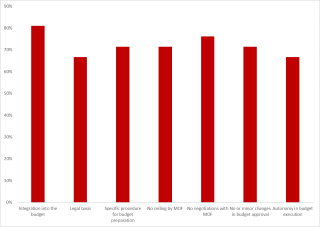
Posted by Johann Seiwald[1]
How do legislatures in Europe prepare and execute their budgets? This question was analysed in a recent survey of 20 EU Member States prepared by the Austrian Parliamentary Budget Office. The purpose of the study was to understand the rules and procedures that determine the budgetary process in national parliaments, the extent of parliamentary budgetary autonomy, and the links with good budget practices. The main results are summarized in Figure 1 below.
The study shows that there is no standard model of how a parliament’s budget is managed but some prevalent institutional features emerge. The main findings are as follows:
- It is common practice across Europe to include information on parliamentary budgets in the package of documents published on the state budget. Only a few countries publish the legislature’s budget as a separate document.
- Two-thirds of the countries surveyed have developed legal safeguards (sometimes included in the constitution) for the budgetary autonomy of the parliament. Many of these laws also define the rules and procedures by which the legislature prepares its budget.
- Northern EU countries (Belgium, Finland, Ireland, the Netherlands, Norway, Sweden, and the UK), as well as some Southern countries (Greece, Portugal, and Spain) generally have the most autonomous parliamentary budget institutions. In Norway and Switzerland, for example, the budget proposal is integrated without change into the federal budget. In Germany, the Council of Elders (Ältestenrat) prepares the Bundestag’s budget which is incorporated in the overall budget. Any revisions by the executive are restricted and require full public disclosure.
- By contrast, in Austria, Croatia, Slovenia, and Romania there is no special protection for the parliamentary budget which is prepared on the same rules and procedures as the budgets for ministries and agencies. A budgetary ceiling is issued by the finance ministry, and negotiations with the parliament then take place to discuss possible amendments and agree the final numbers. In most of the countries surveyed, however, there are no binding ceilings or formal negotiations with the finance ministry, whose role is mainly to help in the coordination of the parliament’s budget proposal and offer technical advice where needed.
- Most countries do not amend the parliament’s budget proposal during the budget debate, mainly because of the legal or institutional safeguards noted above. In some countries the parliament has a right to make changes but does not do so in practice.
- Around two-thirds of the parliaments in the survey have full autonomy in executing their budgets. This means that the finance ministry does not have any authority to approve reallocations between lines of the budget, carryovers from one fiscal year to the next, or financial commitments relating to contracts with suppliers that cover more than one year. Nevertheless, most legislatures submit reports on the implementation of their budgets to the ministry of finance which coordinates and monitors budget execution.
Figure 1. Summary of Budgeting Practices of EU Parliaments
[1] Senior Budget Expert, Parliamentary Budget Office, Austria.
Note: The posts on the IMF PFM Blog should not be reported as representing the views of the IMF. The views expressed are those of the authors and do not necessarily represent those of the IMF or IMF policy.





